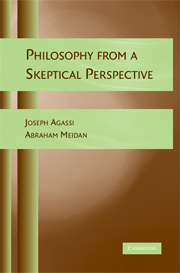1 - Introduction
Published online by Cambridge University Press: 05 June 2012
Summary
Philosophy consists of attitudes toward life or ways of life and inquiries in such regard, and they come in a great variety, of course. Philosophical tradition displays a regular bias in favor of the life of contemplation and equanimity. There was an effort to displace these values with a new tradition – nineteenth-century Romanticism – that emulated the heroes and despots of old and likewise glorified the life of achievements, especially great ones, military and political. The rise of brutal regimes that pride themselves on such achievements has somewhat attenuated the popularity of this enduring and sadistic tradition but, alas, not to the point of extinction.
Philosophical inquiries traditionally center on a small set of questions that presumably signify the choice of an attitude toward life or a way of life. Socrates, the father of Western philosophy, asserted his philosophy of life in his famous slogan: “the unexamined life is not worth living.” His way of life was devoted to preaching this idea by challenging people to examine their own life: he moved throughout the day from one place where people gathered to another, challenging the opinions of anyone who would accept his challenge.
Here are examples of questions that raise discussions that tradition considers philosophical. What are things made of? What kinds of things are there in the world? Is the soul immortal? How can we avoid errors when we seek explanations (of physical or mental events)? What are the right principles of the right moral conduct?
- Type
- Chapter
- Information
- Philosophy from a Skeptical Perspective , pp. 1 - 23Publisher: Cambridge University PressPrint publication year: 2008



